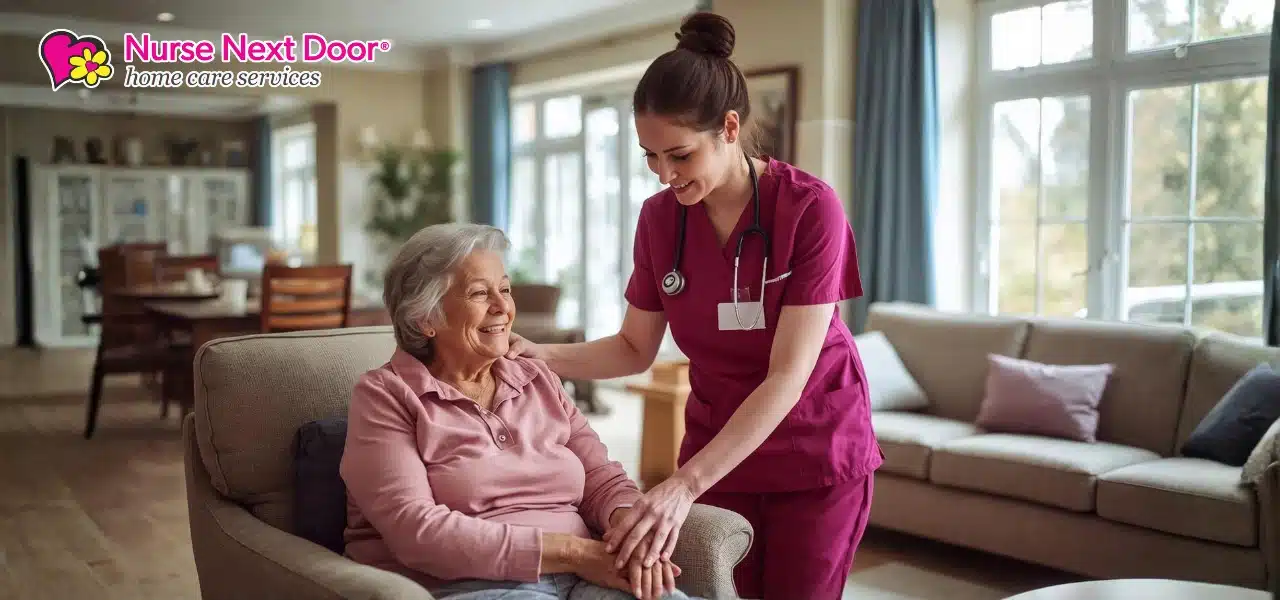
As the U.S. population ages, the number and proportion of individuals and families impacted by Alzheimer’s Disease continue to grow. According to the Alzheimer’s Association, there are nearly 7 million Americans age 65 or older living with the condition, or about 1 out of every 9 seniors.
With so many people facing Alzheimer’s disease, gaining a better understanding of the condition is key to providing the best possible in-home Alzheimer’s care for patients.
Early identification of Alzheimer’s risk factors such as genetic markers and family history can help design personalized care plans that allow patients to remain at home.
How Homecare Assistance Can Elevate Your Life
What Are Alzheimer’s Genetic Markers?
Genetic markers are specific DNA sequences indicating a person’s predisposition to certain diseases. Researchers have identified several genetic markers that may influence whether a person is at greater risk of developing the condition.
There are at least 80 genetic areas associated with Alzheimer’s Disease. Understanding which individual genes play a role — and the specific role they play — can potentially aid in the development of new strategies to treat dementia, delay onset or progression, or perhaps prevent it altogether.
The most well-known genetic marker for Alzheimer’s Disease is the presence of the apolipoprotein E (APOE) gene, specifically the APOE ε4 allele. This gene is involved in making a protein that carries cholesterol and other fats in the bloodstream. Problems in this process are thought to contribute to the development of Alzheimer’s Disease – both high cholesterol and excessive visceral fat have been linked to an increased risk of several types of dementia.
People who inherit one or more copies of the APOE ε4 allele have an increased risk of developing Alzheimer’s Disease at an earlier age. However, it is important to note that not everyone with this genetic variation will develop the disease.
All You Need to Know About Ostomy Care at Home
How Do Genetic Markers Influence Alzheimer’s In-Home Care?
Early awareness of your family’s genetic history provides invaluable insights into risk factors and helps you plan for potential Alzheimer’s in-home care needs.
With this approach, caregivers can anticipate, prepare, and plan for the challenges of this progressive disease. Here are some ways genetic factors influence in-home care for Alzheimer’s patients:
- Early Intervention and Monitoring: If your loved one has high-risk genetic markers, caregivers can start monitoring cognitive function early and focus on early interventions such as cognitive stimulation therapies and memory exercises.
Early detection also allows families to access any available clinical trials or experimental treatments that could slow its progression.
- Personalized Care Approach: Early detection via genetic markers allows caregivers to offer individualized care plans tailored to the specific needs of the patient.
For example, someone with the APOE ε4 allele may experience faster progression of the disease. To compensate, daily routines can be adjusted to ensure that the environment is as supportive as possible, i.e., structured schedules, memory aids such as calendars or photo albums, etc.
- Navigating Caregiver Stress: The realities of life with Alzheimer’s can also significantly impact the emotional and physical well-being of family members serving as caregivers.
Knowing their loved one’s genetic markers helps families understand what to expect in terms of disease progression. This reduces uncertainty and provides a more complete picture of what level of care will be needed. It also helps prepare caregivers for the long-term responsibility of caring for a loved one with Alzheimer’s disease.
A Guide to In-Home Senior Care
Specific Strategies for In-Home Care for Alzheimer’s Patients
Creating a solid in-home care plan with strategies tailored to the individual’s needs can significantly improve their quality of life.
- Structured Routine: A consistent daily routine reduces anxiety and confusion for Alzheimer’s patients and provides a sense of security. A professional caregiver can help establish and maintain a routine with fixed times for meals, activities, and medications.
- Memory Aids: When cognitive decline makes it difficult for Alzheimer’s patients to remember important information, memory aids allow them to maintain a level of independence. Examples include:
- Photographs with labels
- Written contact lists
- Color-coding
- Large-numeral clocks
- Calendars
- Voice-activated alerts
- Smart devices
- Reminder apps
- Home Safety Modifications: As their condition progresses, patients may experience physical impairment, memory loss, and confusion.
To reduce the risk of accidents and injuries, it is essential to modify the home environment to make it safer. A professional team can evaluate the home and make tailored recommendations, such as:
- Removing tripping hazards such as rugs and mats
- Padding sharp corners
- Installing grab bars and non-slip decals in the shower
- Raised toilet seats with handrails
- Lowering the temperature of the water heater
- Using smoke and gas detectors
- Motion-sensing lighting
- Color-coding and signs
- Engagement in Meaningful Activities: Alzheimer’s patients benefit from mental stimulation. Simple activities matching their interests and cognitive abilities help reduce anxiety and improve mood.
Professional caregivers trained in Alzheimer’s-specific activities can choose these activities based on the patient’s abilities. Some ideas include:
- Exercise
- Pets
- Gardening
- Household chores
- Arts and crafts
- Familiar music and dancing
Families should consider using specialized professional Alzheimer’s in-home care providers. Professional caregivers ensure that the patient’s physical and emotional needs are met, while also giving family members the support, guidance, and respite they need.
Why Nurse Next Door?
Caring for a loved one struggling with Alzheimer’s disease can seem overwhelming. But you are not alone – Nurse Next Door is your most trusted resource for home health services in Northern Virginia. Experienced, expert, and compassionate professional caregivers are available.
Nurse Next Door’s RNs, LPNs, CNAs, caregivers, and other trained personnel can support your family. Our in-home Alzheimer’s care services include managing challenging behaviors, facilitating communication, creating a daily routine, playing brain games to stimulate the mind, and preventing the clients from wandering away.
If someone you care about has been diagnosed with Alzheimer’s disease and you need help maintaining their health, safety, dignity, and emotional well-being, reach out to Nurse Next Door to Book a Caring Consult today.



